
Every person is unique!
Our experienced team will be happy to advise you in detail and free of charge on all matters relating to your health. Book your consultation appointment now:
Reishi - The vital mushroom of millennial life
December 13, 2021
Dr. Dorothee Bös et al.
The vital mushroom Reishi can already look back on a history of over 4000 years as a remedy. During this time, it has provided good help for many ailments such as infections, cancer, cardiovascular diseases, oxygen deficiency, obesity, hormone fluctuations, various organ disorders and psychological stress.
With this in mind, in this article we introduce you to the very valuable medicinal mushroom Reishi. We clarify important questions for you such as: What is Reishi good for? When do I take Reishi? And how long do I have to take Reishi before it works?
History and mycology
What is Reishi?
Reishi mushroom is a remedy with a long tradition. Its multiple positive effects on health have been highly appreciated for over 4000 years. Especially the people in East Asia worship him very much. “Divine Mushroom of Immortality” is just one of its many names that healers have given it due to its extensive potency. But its names are almost as numerous as its positive influences on our health: its Latin nomenclature is “Ganoderma Lucidum”. In China it is called “Ling Zhi”.
The name “Reishi” used here comes from the Japanese language area. In German literature this wonderful medicinal mushroom is known as “Glänzender Lackporling”. The doctors of Traditional Chinese Medicine use the Reishi from experience as strengthening and balancing. Due to its harmonizing effect, it can be classified as an adaptogen.
What does Reishi look like and where does it grow?
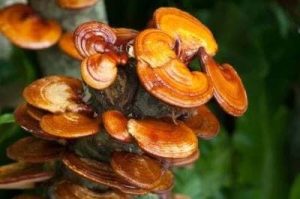 The nicknames “Lucidum” and “Shiny” have been given to the Reishi because of its shiny surface. This can change from brown to purple and always looks as if it has been freshly polished. Young mushrooms can be recognized by a whitish edge. The kidney-shaped hats can grow between six and twenty centimeters. They perch on lateral, bumpy stems that reach up to 15 centimeters in length. The light brown flesh is woody and tastes bitter.
The medicinal mushroom known in mycotherapy in Germany as Glänzender Lackporling is on a par with Cordyceps, Maitake, Shiitake, Hericium, and Auricularia. Although Reishi has been used primarily in East Asia for healing purposes since ancient times, it is also native to Europe. Some even suspect its occurrence on all continents. However, since there are many similar-looking porlings, this thesis could not yet be definitively confirmed. Even here in Germany, it is not so easy to distinguish the Reishi from similar mushrooms. It is found primarily in damp places. It lives as a parasite and often occurs in groups. Its favored subsoils are stumps, roots, and the trunk bases of deciduous trees, especially oaks.
The nicknames “Lucidum” and “Shiny” have been given to the Reishi because of its shiny surface. This can change from brown to purple and always looks as if it has been freshly polished. Young mushrooms can be recognized by a whitish edge. The kidney-shaped hats can grow between six and twenty centimeters. They perch on lateral, bumpy stems that reach up to 15 centimeters in length. The light brown flesh is woody and tastes bitter.
The medicinal mushroom known in mycotherapy in Germany as Glänzender Lackporling is on a par with Cordyceps, Maitake, Shiitake, Hericium, and Auricularia. Although Reishi has been used primarily in East Asia for healing purposes since ancient times, it is also native to Europe. Some even suspect its occurrence on all continents. However, since there are many similar-looking porlings, this thesis could not yet be definitively confirmed. Even here in Germany, it is not so easy to distinguish the Reishi from similar mushrooms. It is found primarily in damp places. It lives as a parasite and often occurs in groups. Its favored subsoils are stumps, roots, and the trunk bases of deciduous trees, especially oaks. Is Reishi dangerous?
Simply request free information brochures now!

After you have sent the completed form, you will receive an e-mail with a download link.
Why should I take Reishi?
The reishi, or shiny lacquer mushroom, is nature’s richly stocked medicine cabinet. It contains over 400 bioactive substances that have not yet been exhaustively researched. Many attempts to extract individual ingredients and use them for medicinal purposes have failed. The special potency of the mushroom is probably due to the interaction of many different substances, such as the two substance groups triterpenes and polysaccharides. Both belong to the group of secondary plant substances. Experts estimate a range of over 140 different triterpenes. 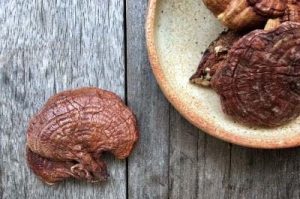 These have anti-inflammatory, antibacterial, tumor growth inhibiting, liver protecting, cholesterol and blood pressure lowering effects. The body reacts to triterpenes in a similar way to anti-inflammatory substances or antihistamines. However, there are no side effects when taking Reishi! The approximately 100 different polysaccharides strengthen the immune system, are antiviral, have antioxidant and antibacterial effects.
These have anti-inflammatory, antibacterial, tumor growth inhibiting, liver protecting, cholesterol and blood pressure lowering effects. The body reacts to triterpenes in a similar way to anti-inflammatory substances or antihistamines. However, there are no side effects when taking Reishi! The approximately 100 different polysaccharides strengthen the immune system, are antiviral, have antioxidant and antibacterial effects.
In the course of this article, learn exactly what physical ailments and diseases these miraculous ingredients can help you with. In general, mycotherapists recommend taking reishi both in the field of prevention and for the specific treatment of acute conditions. In addition to these special medicinally active substances, a shiny lacquer spore contains the usual macronutrients such as protein, fat, carbohydrates and fiber. It is also rich in micronutrients, such as potassium, calcium, magnesium, selenium, zinc, iron, copper, vitamins B1, 2, 3 & 5, vitamin D and all essential amino acids.
What is Reishi good for?
Balm for psyche and nerves
 The mushroom has a balancing and relaxing effect. The advantage over modern sedatives and sleeping pills is that there are no side effects when taking Reishi. There is also no potential for addiction. Take Reishi as capsules to shorten your time to sleep. At the same time, your sleep quality will increase, making you feel more awake despite the fact that your sleep duration remains the same.
Scientists attribute this mode of action to the fact that the reishi mushroom increases sensitivity to the neurotransmitter GABA. This is lacking in stress and sleep problems. Due to increased sensitivity, even a small amount of the neurotransmitter has a large effect. Due to its ability to create psychological balance, it also reduces stress-related physical manifestations. It also has a very specific effect on tense muscles. Thus, the adenosine from the reishi mushroom inhibits the action of the neurotransmitter acetylcholine. This results in reduced stimulus transmission between neurons and muscles. This is especially helpful for relieving stress-related muscle tension, which is common in the shoulder and neck area. However, the Reishi does not only have a sedative effect, i.e. a calming effect on the human organism. As a harmonizing mushroom, it is also a tonic for people who feel weak and dull. It awakens the spirits and helps to maintain a healthy activity level. This earns him great popularity among athletes.
The mushroom has a balancing and relaxing effect. The advantage over modern sedatives and sleeping pills is that there are no side effects when taking Reishi. There is also no potential for addiction. Take Reishi as capsules to shorten your time to sleep. At the same time, your sleep quality will increase, making you feel more awake despite the fact that your sleep duration remains the same.
Scientists attribute this mode of action to the fact that the reishi mushroom increases sensitivity to the neurotransmitter GABA. This is lacking in stress and sleep problems. Due to increased sensitivity, even a small amount of the neurotransmitter has a large effect. Due to its ability to create psychological balance, it also reduces stress-related physical manifestations. It also has a very specific effect on tense muscles. Thus, the adenosine from the reishi mushroom inhibits the action of the neurotransmitter acetylcholine. This results in reduced stimulus transmission between neurons and muscles. This is especially helpful for relieving stress-related muscle tension, which is common in the shoulder and neck area. However, the Reishi does not only have a sedative effect, i.e. a calming effect on the human organism. As a harmonizing mushroom, it is also a tonic for people who feel weak and dull. It awakens the spirits and helps to maintain a healthy activity level. This earns him great popularity among athletes. Harmonization of the hormonal system: menopause and hair loss
A very appreciated property of Reishi is its balancing effect on the hormonal system. It supports the body to stay in balance at the endocrine level. If the balance is disturbed, as is the case during menopause, for example, the reishi mushroom helps to restore it. Thus, it effectively counteracts unpleasant symptoms such as palpitations, sweating, nervousness and lack of drive.
It supports the body to stay in balance at the endocrine level. If the balance is disturbed, as is the case during menopause, for example, the reishi mushroom helps to restore it. Thus, it effectively counteracts unpleasant symptoms such as palpitations, sweating, nervousness and lack of drive.
Thyroid gland
Many people today have a problem with their thyroid gland, a key endocrine organ. In addition to hyperthyroidism or hypothyroidism, there are several other conditions affecting the health of the thyroid gland. If the thyroid gland is out of balance, this affects not only the hormone system, but the entire organism. This is where Reishi can help restore function to healthy levels. In particular, Reishi counteracts unwanted attacks of the immune system on the thyroid gland. Therefore, it is often used for the autoimmune diseases Graves’ disease and Hashimoto’s disease. Its anti-inflammatory properties also help fight the rather rare thyroiditis.
Hair loss
On the subject of hair loss and Reishi, the mechanisms of action have not yet been definitively clarified. In both men and women, the hormone dihydrotestosterone (DHT) plays a crucial role in the density of scalp hair as they age. The body synthesizes DHT from the better known testosterone with the help of a certain enzyme. A high DHT level is in turn said to be causative for hair loss. In a study on mice, it has now been shown that the ingredients of Reishi can inhibit this particular enzyme in the production of DHT. In addition, Reishi suppresses prostate growth in men. This in turn has a positive effect on DHT levels. Whether these results can be transferred 1:1 to humans is still unclear. However, since other modes of action of Reishi could already be generalized from animals to humans, the assumption is obvious. In any case, the shiny lacquer fungus promotes the health of the scalp, which has a positive effect on hair growth.
EXPERIENCE REPORTS
In search of effective natural measures, a self-help group of parents of children suffering from neurodermatitis became aware of the Reishi. 80 percent of the children reacted positively to the medicinal mushroom. I.e. the neurodermatitis gradually receded and within three months the skin condition returned to normal.
Lose weight with Reishi
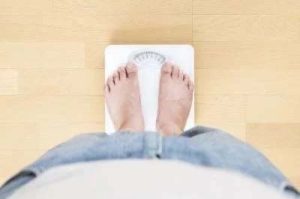 People who want to lose weight can benefit in many ways from reishi and its wonderful ingredients. For example, in an animal experiment, scientists showed that body weight decreased when animals were given reishi, despite a high-fat diet. In addition, the medicinal mushroom curbed chronic inflammation in the body, which is always present in people who are overweight. It thus protects against serious secondary diseases of obesity such as cancer or autoimmune diseases.
People who want to lose weight can benefit in many ways from reishi and its wonderful ingredients. For example, in an animal experiment, scientists showed that body weight decreased when animals were given reishi, despite a high-fat diet. In addition, the medicinal mushroom curbed chronic inflammation in the body, which is always present in people who are overweight. It thus protects against serious secondary diseases of obesity such as cancer or autoimmune diseases.
Lower blood sugar with Reishi
Further weight loss support results from the medicinal mushroom’s ability to balance blood sugar. In return, Reishi increases the sensitivity of the body’s cells to insulin without side effects. Harmonious blood sugar levels reduce the risk of food cravings, which is clearly an advantage when dieting. Obesity is usually accompanied by an imbalance of the intestinal flora. This intestinal dysbiosis is the result of an unbalanced diet and causes unfavorable processes during digestion. A vicious circle is created. Successfully reducing one’s weight under these conditions is incomparably more difficult. This is where the polysaccharides from the reishi mushroom come in as an effective prebiotic. They help the intestinal flora to regain its healthy balance. At the same time, reishi reduces increased permeability of the intestine, which often occurs with obesity. This manifests itself both on the scales and in the general state of health of those affected.
Positive effects of reishi in metabolic syndrome.
In connection with overweight in our time is almost always the so-called metabolic syndrome. In this case, obesity is compounded by the factors of high blood pressure, dyslipidemia and insulin resistance. Acutely, the liver in particular suffers under these unfavorable conditions. This leads to what is known as fatty liver. It is therefore all the more pleasing that the triterpenes and ganodermic acids contained in reishi can lower total cholesterol both in the liver and in the blood plasma.
As a result of taking Reishi capsules, the organism synthesizes less cholesterol and at the same time accelerates its metabolism. In addition, the importance of detoxification processes in weight loss should not be underestimated. Those who lose weight break down long-stored fat. Various toxins are dissolved in this fat, which are released again during weight loss. Here, the Reishi shows its effect on two levels: On the one hand, it generally stimulates the elimination of toxins from the body. On the other hand, it is a benefactor for the liver, which in turn is the leading organ in detoxification processes.
Cardiovascular diseases: When to take Reishi?
This unique vital mushroom strengthens the entire cardiovascular system. 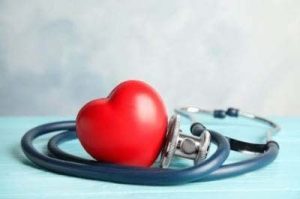 Of course, the heart as the central organ of the blood circulation benefits from the higher oxygen content of the blood through Reishi. In addition, the ingredients of reishi inhibit lipid accumulation and platelet aggregation in the blood. This reduces the risk of blood vessels becoming clogged. These effects are complemented by a blood purifying effect. The medicinal mushroom thus improves blood circulation throughout the organism. It counteracts arteriosclerosis and ensures balanced blood pressure. In addition, in connection with Reishi there is the experience that clinically noticeable heart stuttering is reduced by regular intake.
Of course, the heart as the central organ of the blood circulation benefits from the higher oxygen content of the blood through Reishi. In addition, the ingredients of reishi inhibit lipid accumulation and platelet aggregation in the blood. This reduces the risk of blood vessels becoming clogged. These effects are complemented by a blood purifying effect. The medicinal mushroom thus improves blood circulation throughout the organism. It counteracts arteriosclerosis and ensures balanced blood pressure. In addition, in connection with Reishi there is the experience that clinically noticeable heart stuttering is reduced by regular intake.
What is Reishi good for in cancer therapy?
In cancer therapy, Reishi can support treatment and alleviate side effects. But it also has mechanisms of action that can prevent cancer from developing in the first place.
Prevention in the development of tumors
First of all, the Reishi has an effect that prevents the formation of tumors. In fact, it is able to reduce oxidative stress in the body. To do this, it activates superoxide dismutase, glutathione S-transferase and laccase on the one hand. On the other hand, it supports and accelerates detoxification processes in the body, which also produce free radicals. 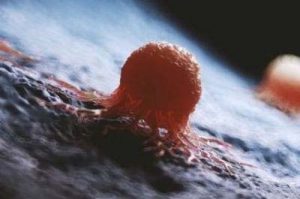 Perhaps they are familiar with oxidative stress from the field of anti-aging? Here, too, the aim is to bind free radicals in order to prevent their cell-destroying effect. However, the damage to body cells does not only manifest itself in signs of aging such as wrinkles. Free radicals are also capable of permanently destroying cell DNA in such a way that cancer can develop.
Perhaps they are familiar with oxidative stress from the field of anti-aging? Here, too, the aim is to bind free radicals in order to prevent their cell-destroying effect. However, the damage to body cells does not only manifest itself in signs of aging such as wrinkles. Free radicals are also capable of permanently destroying cell DNA in such a way that cancer can develop.
If you look at the current research landscape, you will notice many studies on Reishi and cancer therapy from China. As the Western diet has now also reached the Far East, typical diseases of civilization such as arteriosclerosis, diabetes and cancer are becoming increasingly common there. One reason for this is to be found in the chronic inflammations that keep the body in a constant state of flux when people are overweight. It is precisely at this point that the Reishi intervenes preventively by inhibiting inflammation.
Supportive effect in the treatment of cancer
- Breast Cancer
- Prostate Cancer
- Ovarian Cancer
- Lung cancer
- Liver cancer
Reishi for immune system support
A significant use for the Reishi, also known in German as Glänzender Lackporling, is to support the immune system.
Mode of action in the immune defense
The terpenes contained stimulate the production of B and T cells, which are so important for the immune defense. Thanks to its antioxidant effect, it simultaneously protects the cells of the immune system from external damage. In addition, Reishi contains proteins that are identical to those of the body’s defense system.  Due to all these mechanisms and probably more, the Reishi mushroom is a valuable support of the human immune system. You don’t even have to set the dosage of Reishi very high to achieve the protective and preventive effect. When taken regularly, neither viruses nor bacteria have a good chance to dock. However, should they ever enter the organism, the Reishi hinders their multiplication. Ultimately, the Reishi also establishes a harmonious balance of the immune system. This is particularly important in the case of exaggerated reactions such as allergies or other autoimmune diseases.
Due to all these mechanisms and probably more, the Reishi mushroom is a valuable support of the human immune system. You don’t even have to set the dosage of Reishi very high to achieve the protective and preventive effect. When taken regularly, neither viruses nor bacteria have a good chance to dock. However, should they ever enter the organism, the Reishi hinders their multiplication. Ultimately, the Reishi also establishes a harmonious balance of the immune system. This is particularly important in the case of exaggerated reactions such as allergies or other autoimmune diseases.
Examples of immunomodulatory effect
- Defense against colds and other infections
- HIV: protection from infection and support for therapy
- Herpes zoster: relief of pain and skin symptoms
- Herpes simplex: Prevents the herpes virus from entering the host cell.
- Autoimmune diseases: Excessive reactions of the immune system occur less frequently when the whole mushroom is taken. This effect has proven effective in Hashimoto’s thyroiditis and lupus erythematosus, among others.
- Allergies: Similar to the drug cortisone, the triterpenes from Reishi inhibit the release of histamines, which are responsible for red, itchy skin and swelling in allergies.
- Neurodermatitis: In the treatment of a group of children with neurodermatitis, 80% responded positively to the intake of Reishi. Within three months, her skin condition returned to normal.
- Rheumatoid arthritis: Reishi intervenes inhibitory at the level of the immune system in this autoimmune disease and relieves inflammation.
How does Reishi affect the organs?
Reishi has a positive influence on our organs in many ways. One factor that benefits every tissue and therefore every organ is the increase in oxygen supply. The germanium from the vital mushroom ensures that the oxygen saturation of the blood increases. As a result, the cells in the body are better supplied. This effect can be particularly beneficial for those who absorb too little oxygen due to respiratory disease. For altitude sickness, reishi is an effective remedy for symptom relief for the same reason. Its use has already proven itself in missions at the heights of the Himalayas. Another group that appreciates higher blood oxygen saturation is athletes. Reishi makes them more persistent and powerful. In the following we will give you an overview of different organs in humans. You will learn in which way the Reishi affects the respective organ and what this can mean for your health.
Liver
The liver is virtually the central area of action of the Reishi mushroom. It supports them in their detoxifying function. On the one hand, Reishi generally promotes the work of the body’s detoxification enzymes. On the other hand, it protects the liver from oxidative stress and helps it process fat-soluble toxins. Reishi also has anti-inflammatory effects in liver disease hepatitis and anti-fibrotic effects in cirrhosis.
Skin
The skin benefits directly from a high liver output. Substances that promote detoxification and blood purification automatically reduce the symptoms of various skin diseases. We have already reported on allergies and neurodermatitis above.
Kidneys
Reishi cranks up the work of the kidneys. It also supports the treatment of cysts on the kidneys. When using drugs that are harmful to the kidneys, Reishi dampens the side effects. Diabetics in particular often have problems with their kidneys. They are helped by the kidney-protective as well as the blood sugar-regulating function of Reishi. At best, its use allows sufferers to reduce their insulin dose.
Lungs
Here, experience has shown that Reishi reduces the suffering of people suffering from asthma, chronic bronchitis, shortness of breath or upper respiratory tract diseases. Of course, the high oxygen saturation of the blood is an advantage here.
Brain
Reishi shows protective properties related to the human brain. Thus, it reduces the risk of plaque formation, which can lead to dementia over time.
Stomach
The use of Reishi can accelerate the healing of stomach ulcers. The vital mushroom supports the gastric mucosa during regression. Preventive use in the case of stress, poor diet and smoking is also useful to protect the stomach.
Intestine
Especially in relation to our central health organ, the intestine, the Reishi is a true miracle cure. Thus, it provides relief for irritable bowel syndrome, inhibits the growth of candida, and reseals the intestine in leaky gut syndrome. It reduces the “fattening” bacteria and restores the balance of intestinal flora.
Shiny Lackporling in the food bowl - What does the Reishi mushroom do to animals?
Reishi works in dogs, cats, horses and other animals in a similar way to humans. When using Reishi in capsules, they can be opened just before use and the contents added to the food. Each keeper can also use his proven tricks for administration. Ideally, you should discuss how high the Reishi dosage should be for your animal with your veterinarian, veterinary practitioner or an expert in mycotherapy. Since each animal is individual and the dosage depends on various factors such as age, constitution, vital energy and the desired area of application, no general statement can be made. However, the basic principle is always to start with the lowest possible dosage and increase it slowly. In pregnant or lactating animals, mycotherapy may be performed if indicated. If your animal has been given Reishi powder for a long time (at least 4 weeks), it can be continued.
Since each animal is individual and the dosage depends on various factors such as age, constitution, vital energy and the desired area of application, no general statement can be made. However, the basic principle is always to start with the lowest possible dosage and increase it slowly. In pregnant or lactating animals, mycotherapy may be performed if indicated. If your animal has been given Reishi powder for a long time (at least 4 weeks), it can be continued.
Initial deteriorations in your pet’s overall condition are detoxification symptoms from Reishi occurring as a first reaction – not side effects. The detoxification process is manifested in animals mainly by gastrointestinal problems and skin rashes, in dogs and cats also by red ears or ear discharge, and in cats and horses by coughing. If such initial reactions occur, the dosage should be reduced or the administration should be interrupted for a few days.
The following effects of the reishi – also known as the glossy paint spore – have been observed in animals so far:
- Reduction of symptoms in respiratory diseases, asthma and allergies
- Improved skin appearance for skin problems
- Reduction of pain in diseases of the musculoskeletal system
- Strengthening for heart disease
- Reduction of inflammatory processes in gastrointestinal diseases
- Positive effects in the accompaniment of cancer therapies
- Strengthening the immune system
What should I pay attention to when taking Reishi?
The method of presentation
Common dosage forms in which Reishi is offered are capsules, powder, and liquid extract. 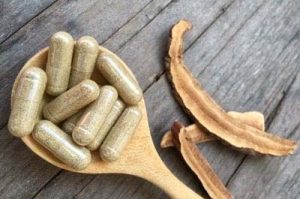 In the case of powder, it is important that drying takes place at a maximum of 40° Celsius. At higher temperatures, the health-promoting enzymes are destroyed. The valuable ingredients of the Reishi mushroom are found in its fruiting body and also the spores. The latter lie as a brown layer on the hat. Therefore, when buying Reishi powder, make sure that it was obtained from the whole mushroom.
In the case of powder, it is important that drying takes place at a maximum of 40° Celsius. At higher temperatures, the health-promoting enzymes are destroyed. The valuable ingredients of the Reishi mushroom are found in its fruiting body and also the spores. The latter lie as a brown layer on the hat. Therefore, when buying Reishi powder, make sure that it was obtained from the whole mushroom.
When does the effect of Reishi occur?
Basically, the Reishi begins to unfold its effect in the organism immediately upon ingestion. However, this is a gentle process that takes some time to reach its full level of effectiveness. We generally recommend taking Reishi for several weeks to several months. Overall, its use as a preventive and curative agent is harmless, as there are no known side effects with the Reishi.
How high should one dose Reishi?
It would be negligent to make a blanket statement at this point about how high the Reishi dosage should be. 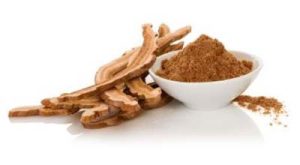 This is because, in addition to you as a person, it also clearly depends on the particular preparation. Furthermore, it is crucial whether you want to take Reishi acutely against a specific ailment or it is a preventive measure. In a specific case, consult an expert in mycotherapy.
This is because, in addition to you as a person, it also clearly depends on the particular preparation. Furthermore, it is crucial whether you want to take Reishi acutely against a specific ailment or it is a preventive measure. In a specific case, consult an expert in mycotherapy.
Where can you buy Reishi?
There are many different suppliers who sell a wide range of preparations. You should always look for a long experience of the grower with Reishi when making your purchase decision. In fact, a shiny lacquer porling is very easy to confuse with other porlings. The preparations almost never come from wild collections. Since mushrooms in particular absorb environmental toxins like a sponge, organic cultivation without the use of toxins is also very important. Due to the high quality standards, we always recommend vital mushrooms from German organic cultivation.
For mushroom powders there are many suppliers
You will find trustworthy suppliers with controlled organic cultivation in Germany, but unfortunately also less recommendable importers of cheap goods. Read what is important when buying.
DO YOU HAVE ANY QUESTIONS?
We will gladly take time for you. In our free consultation we answer individually and personally all your health questions under:

Every person is unique!
Our experienced team will be happy to advise you in detail and free of charge on all matters relating to your health.
Scientific studies / sources
- K.Tasaka,…: “Antiallergic constituents in the culture medium of Ganoderma lucidum.(I) Inhibitory effect of oleic acid on histamine release”; Agents and Actions, vol. 23, 3 / 4 (1988)
- Hiroshi Koda,…: “The Biologically Active Constituents of Ganoderma lucidum (Fr.) Karst. Histamine Release-Inhibitory Triterpenes.”; Chem. Pharm. Bull., 33(4), 1367- 1374 (1985).
- K.Tasaka,…: ” Antiallergic constituents in the culture medium of Ganoderma lucidum.(II) The inhibitory effect of cyclooctasulfur on histamine release.”; Agents and Actions, vol. 23, 3 / 4 (1988)
- Yearul Kabir,…: “Dietary Effect of Ganoderma lucidum Mushroom on Blood Pressure and Lipid Levels in Spontaneously Hypertensive Rats (SHR).”; J. Nutri. Sci. Vitaminol., 34, 433-438, 1988.
- Guo-Liang Zhang,…: “Hepatoprotective role of ganoderma lucidum polysaccharide against BCG-induced immune liver injury in mice.”; World J. Gastroenterol 2002 August 15; 8(4): 728-733.
- Ying-Hua Shich,…: “Evaluation of the Hepatic and Renalprotective Effects of Ganoderma lucidum in Mice.”; Am. Journal of Chinese Med. vol. 29, nos.3-4, pp. 501-507, 2001.
- Yasuyo Hijikata, Seika Yamada: “Effect of Ganoderma lucidum on Postherpetic Neuralgia!”; Am. Journal of Chin. Med., Vol. XXVI, No. 3-4, pp. 375-381, 1998.
- Hsue-Yin Hsu,…: “Radioprotective Effect of Ganoderma Lucidum (Leyss. Ex. Fr.) Karst after X-ray Irradiation in Mice.”; Am. Journal of Chin. Med., Vol. XVIII, Nos. 1-2, pp. 61-69, 1990.
- William M.W. Cheung,…: “Ganoderma extract activates MAP kinases and induces the neuronal differentiation of rat Pheochromocytoma PC12 Cells.”; FEBS Letters 486 (2000) 291-296.
- Seong-Kug Eo,…: “Possible mode of antiviral activity of acidic protein bound polysaccharide isolated from Ganoderma lucidum on herpes simplex viruses.”; Journal of Ethnopharmacology 72 (2000) 475-481.
- Prof. Dr. med. Ivo Bianchi: “Modern Mycotherapy”; Hinckel Druck, 2008
- Hobbs, C.: “Medicinal Mushrooms”; Botanica Press, 1995.
